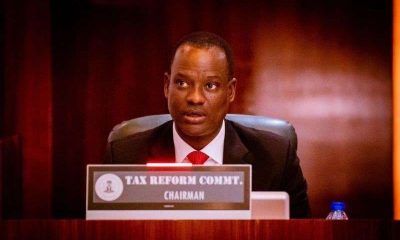Business
FG defends proposed 5% fuel surcharge, says revenue to fix roads

The Federal Government has defended the proposed 5 percent fuel surcharge, insisting that the measure is aimed at generating funds to rehabilitate Nigeria’s dilapidated road network rather than imposing an additional burden on citizens.
Chairman of the Presidential Committee on Fiscal Policy and Tax Reforms, Taiwo Oyedele, made this clarification on Tuesday during an interview on Channels Television’s Morning Brief. He acknowledged public concerns that the surcharge could fuel inflation but stressed that better road infrastructure would ultimately help reduce transportation costs and stabilise prices.
“I know everybody is concerned about the impact on inflation; I’m concerned myself,” Oyedele said. “But around the world, road infrastructure is very important. Nigeria has about 200,000 kilometres of road, and only about 60,000 are okay. This is a major reason why transporting goods and people is costly and unsafe.”
The 5 percent surcharge is contained in the recently enacted Nigeria Tax Act, 2025, and is proposed to take effect from January 2026.
However, the plan has sparked widespread anxiety over possible inflationary effects, with the Trade Union Congress (TUC) threatening to embark on a nationwide strike within two weeks if the government fails to drop the levy.
Oyedele explained that the charge is not new, noting that it was first introduced in 2007 but was never implemented due to fuel subsidies. He said the removal of subsidies has created fiscal space, but additional revenue streams are needed to close the infrastructure gap.
“Even with the removal of fuel subsidy, the huge gap we have in infrastructural development cannot be addressed by those revenues alone,” he said.
To minimise inflationary impact, Oyedele said the timing of implementation would be carefully managed. According to him, the surcharge could take effect when the naira appreciates or global crude prices fall, cushioning the impact on pump prices.
“If the naira gains about 5 percent and you put in this tax, nobody will notice the change. Or if crude oil prices drop by 5 percent, that would also be a good time,” he added.
The funds, Oyedele assured, will be ring-fenced and dedicated solely to road projects. He highlighted the success of the Road Infrastructure Tax Credit Scheme, which has enabled private firms such as Dangote, NLNG, Lafarge and MTN to rehabilitate key roads.
The tax reform chief urged Nigerians to keep an open mind, noting that the policy could be reviewed or scrapped if it fails to deliver the intended benefits.
“If it can’t work, the process is there for the National Assembly to remove it from the law,” he said.







